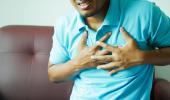Sometimes, a toothache or jaw pain could be a manifestation of impending heart disease, warns Dr Ajit Menon, senior interventional cardiologist at Sir HN Reliance Foundation Hospital.
- Health-related questions? Ask rediffGURUS HERE.

Until a few years ago, heart disease used to affect only the elderly.
Today, we have youngsters in the age group of 25 to 45 years suffering from various stages of cardiac disease.
Can a heart attack be avoided in young adults?
What are some of the warning signs that people can look for?
1. Family history of cardiac disease
The first indicator is family history.
If the person has a strong family history of heart disease, which means that someone in her/his family or a close relative has had a cardiac event below the age of 55 or 60 years, it is a major risk factor.
What we are particularly interested in knowing is if the mother has had cardiac history below the age of 60. In such cases, chances that the children will get it are extremely high.
The same rule applies if a sibling has had a cardiac event recently or there has been a sudden cardiac death.
The history of sudden cardiac deaths in the family is a strong indicator that a person should get checked for cardiac issues earlier in life.
2. Discomfort or pain in the chest, jaw or arm
A person might face exertional chest discomfort, exertional jaw pain, exertional arm pain or exertional backache, which happens typically when the person exerts and typically settles down when the person stops doing the activity.
This normally happens when the person does an unusual exercise or activity to begin with and, subsequently, there is progression of the symptoms -- the person starts getting these symptoms even with normal day-to-day activities.
3. Breathlessness at night
If a person complains of chest discomfort or acute breathlessness in the middle of the night while sleeping and has to sit up to get relief, it is not a healthy sign.
This is an indicator that s/he could be harbouring a heart disease.
Unusual breathlessness on exertion should also be a warning sign.
4. Toothache or jaw pain
Sometimes, people go with toothache or jaw pain to a dentist and find out that there is nothing wrong.
This could, however, be a manifestation of impending heart disease.
5. Blackouts
Another symptom of heart disease could be that the person gets blackouts.
This happens because her/his blood pressure varies suddenly.
This may be attributed to certain cardiac conditions or even blockages in the arteries supplying blood to the heart muscles. On exertion, the blood supply to the electrical activation node in the heart gets compromised and the person's heart starts getting rhythm disturbances.
6. Unexplained, acute breathlessness
Another symptom is a sudden onset of acute breathlessness while doing nothing.
7. Abdominal discomfort after eating
A common sign is symptoms of abdominal discomfort or chest discomfort, especially after eating.
This is called a post-triangular angina which, in layman's language, means post-food heart pain.
The blood supply to the heart gets compromised after eating a meal because the blood is diverted to the gastrointestinal system; s/he starts feeling discomfort in the chest because there could be blockages in the arteries supplying blood to the heart muscle.
8. High cholesterol and lipoprotein
On routine blood tests, if extremely high cholesterol and extremely high bad cholesterol (LDL or low density lipoprotein cholesterol) is indicated, the person might be prone to heart disease.
High homocysteine and high lipoprotein A levels could also indicate a heart-related issue.
There are certain genetic genome testing options available today which can predict the possibility of having a cardiac event, especially if there is a family history of any cardiac disease, be it blockages or any kind of structural heart disease.
Even children can get tested for genome sequencing, which can tell you the probability of having this health issue in the family.
- Health-related questions? Ask rediffGURUS HERE.

Disclaimer: All content and media herein is written and published online for informational purposes only. It is not a substitute for professional medical advice. It should not be relied on as your only source for advice.
Please always seek the guidance of your doctor or a qualified health professional with any questions you may have regarding your health or a medical condition. Do not ever disregard the advice of a medical professional, or delay in seeking it because of something you have read herein.
If you believe you may have a medical or mental health emergency, please call your doctor, go to the nearest hospital, or call emergency services or emergency helplines immediately. If you choose to rely on any information provided herein, you do so solely at your own risk.
Opinions expressed herein cannot necessarily provide advice to fit the exact specifics of the issues of the person requesting advice.











 © 2025
© 2025